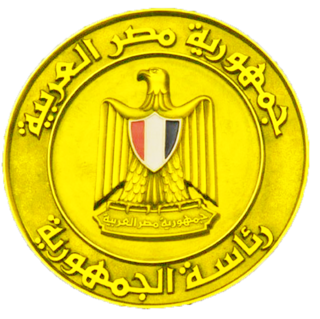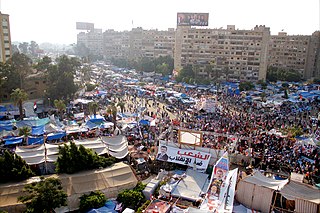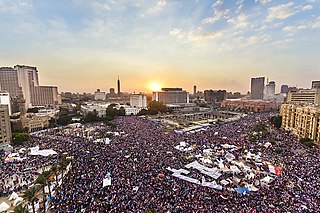Related Research Articles

The president of the Arab Republic of Egypt is the executive head of state of Egypt and the de facto appointee of the official head of government under the Egyptian Constitution of 2014. Under the various iterations of the Constitution of Egypt following the Egyptian Revolution of 1952, the president is also the supreme commander of the Armed Forces, and head of the executive branch of the Egyptian government.
According to most scholars the history of modern Egypt dates from the start of the rule of Muhammad Ali in 1805 and his launching of Egypt's modernization project that involved building a new army and suggesting a new map for the country, though the definition of Egypt's modern history has varied in accordance with different definitions of modernity. Some scholars date it as far back as 1516 with the Ottomans' defeat of the Mamlūks in 1516–17.
Liberalism in Egypt or Egyptian liberalism is a political ideology that traces its beginnings to the 19th century.
The Muslim Brotherhood is an Islamic organization that was founded in Ismailia, Egypt by Hassan al-Banna in March 1928 as an Islamist religious, political, and social movement. The group spread to other Muslim countries but has its largest, or one of its largest, organizations in Egypt, where for many years it has been the largest, best-organized, and most disciplined political opposition force, despite a succession of government crackdowns in 1948, 1954, 1965 after plots, or alleged plots, of assassination and overthrow were uncovered. Following the 2011 Revolution the group was legalized, and in April 2011 it launched a civic political party called the Freedom and Justice Party (Egypt) to contest elections, including the 2012 presidential election when its candidate Mohamed Morsi became Egypt's first democratically elected president. One year later, however, following massive demonstrations, Morsi was overthrown by the military and arrested. As of 2014, the organization has been declared a terrorist group by Russia, Egypt, UAE, Saudi Arabia and is once again suffering a severe crackdown.
The History of Republican Egypt spans the period of modern Egyptian history from the Egyptian Revolution of 1952 to the present day, which saw the toppling of the monarchy of Egypt and Sudan, the establishment of a presidential republic, and a period of profound economic, and political change in Egypt, and throughout the Arab world. The abolition of a monarchy and aristocracy viewed widely as sympathetic to Western interests, particularly since the ousting of Khedive Isma'il Pasha, over seven decades earlier, helped strengthen the authentically Egyptian character of the republic in the eyes of its supporters.

Mohamed Elbeltagy is an Egyptian physician, professor at Al-Azhar university and Muslim Brotherhood politician. He was a Member of Parliament from 2005 to 2010 and 2011 to 2012, and constitute assembly 2012. Currently the general secretary of the Freedom and Justice Party.

The Egyptian Crisis was a period that started with the Egyptian revolution of 2011 and ended with beginning of the presidency of Abdel Fattah el-Sisi in 2014. It was a tumultuous three years of political and social unrest, characterized by mass protests, a series of popular elections, deadly clashes, and military reinforcement. The events have had a lasting effect on the country's current course, its political system and its society.

Mohamed Mohamed Morsi Eissa al-Ayyat was an Egyptian politician, engineer, and professor who was the fifth president of Egypt, from 2012 to 2013, when General Abdel Fattah el-Sisi removed him from office in a coup d'état after protests in June. An Islamist affiliated with the Muslim Brotherhood organization, Morsi led the Freedom and Justice Party from 2011 to 2012.

Mohammed Khairat Saad el-Shater is an Egyptian engineer, businessman and Islamist political activist. A leading member of the Muslim Brotherhood, as the Deputy Supreme Guide, el-Shater was the initial candidate of the movement's Freedom and Justice Party during the 2012 Egyptian presidential election before being disqualified by the election commission. Previously, he was the deputy chairman of the Brotherhood.
Following the 2011 Egyptian revolution, the Muslim Brotherhood in Egypt became one of the main forces contending for political power in Egypt against the Supreme Council of the Armed Forces (SCAF) and other established centers of the former Hosni Mubarak regime.
Ahmed Mekki was the Minister of Justice of Egypt from 2 August 2012 until he submitted his resignation to President Morsi on 20 April 2013. He was a member of the Qandil Cabinet. Mekki was one of the independent ministers in the cabinet. He is the brother of the former vice president Mahmoud Mekki, who resigned from office on 22 December 2012.

Mahmoud Mekki is an Egyptian politician who served as the vice president of Egypt from August 2012 to December 2012. He was appointed by President Mohamed Morsi following the 2011 revolution and the 2012 presidential election on 12 August 2012. He was Egypt's first vice president from a civilian background rather than a military one. He resigned from his post on 22 December 2012.

The National Salvation Front is an alliance of Egyptian political parties, formed to defeat Egyptian President Mohammed Morsi's 22 November 2012 constitutional declaration. The National Front for Salvation of the Revolution has more than 35 groups involved overall. Observers are concerned that the NSF will not be able to become a coherent political force because the different parties agree on opposing Morsi, but their views on other subjects diverge.

The following is a chronological summary of the major events that occurred after the Egyptian Revolution of 2011, after Mohamed Morsi's election as the fifth President of Egypt, on 30 June 2012. This article documents the third wave of the Egyptian Crisis.

A constitutional referendum was held in Egypt in two rounds on 15 and 22 December 2012. Egyptians living abroad were scheduled to vote between 8 and 11 December. Voting for expatriates had been delayed until 12 December 2012 and was extended until 17 December 2012. Voters were asked whether they approve of the draft constitution that was approved by the Constituent Assembly on 30 November 2012.

The 2012–2013 Egyptian protests were part of the crisis in Egypt including the June 2013 protests, the July 2013 coup d'état, and part of the post-coup unrest. They saw varying opposition against three contiguous heads of state; namely, the Supreme Council of the Armed Forces (SCAF), Muslim Brotherhood, and the de facto ruling Egyptian Armed Forces.

The 2013 Egyptian coup d'etat took place on 3 July 2013. Egyptian army chief General Abdel Fattah el-Sisi led a coalition to remove the democratically elected President of Egypt Mohamed Morsi from power and suspended the Egyptian constitution of 2012. The move came after the military's ultimatum for the government to "resolve its differences" with protesters during widespread national protests. The military arrested Morsi and Muslim Brotherhood leaders, and declared Chief Justice of the Supreme Constitutional Court Adly Mansour as the interim president of Egypt. The announcement was followed by demonstrations and clashes between supporters and opponents of the move throughout Egypt.

The 30 June revolution occurred in Egypt on 30 June 2013, marking the one-year anniversary of Mohamed Morsi's inauguration as president. The events ended with the 2013 Egyptian coup d'état after mass protests across Egypt demanding the immediate resignation of the president. The rallies were partly a response to Tamarod, an ostensibly grassroots movement that launched a petition in April 2013, calling for Morsi and his government to step down. Tamarod claimed to have collected more than 22 million signatures for their petition by June 30, although this figure was not verified by independent sources. A counter-campaign in support of Morsi's presidency, named Tagarod, claimed to have collected 26 million signatures by the same date, but this figure was also unverified and not mentioned in media nearly as much as Tamarod's, with no reliable sources repeating it. The movements in opposition to Morsi culminated in the June 30 protests that occurred across the country. According to the Egyptian military, which calculated the number of protesters via helicopter scans of demonstration perimeters across the country, the June 30 protests had 32 million protesters, making them "the biggest protests in Egypt's history." However, independent observers raised concerns that the Egyptian government exaggerated the actual number of anti-Morsi protestors, with some research determining that only around one to two million people protested across the country against Morsi.

Protests against the 2013 Egyptian coup d'état erupted in July 2013. Immediately following the removal of President Mohamed Morsi by the Egyptian Armed Forces on 3 July 2013 amid demonstrations against Morsi's rule, many protesters amassed near the Rabia Al-Adawiya Mosque to call for Morsi's return to power and condemn the military, while others demonstrated in support of the military and interim government. Deadly clashes such as Rabaa massacre continued for several days, with three particularly bloody incidents being described by officials as "massacres" perpetrated by security forces. During the month of Ramadan, prime minister Hazem al-Beblawy threatened to disperse the ongoing Pro-Morsi sit-ins in Rabaa al-Adaweya square and al-Nahda square. The government crackdown of these protests occurred in a violent dispersal on 14 August 2013. In mid-August, the violence directed by the army towards the protesters escalated, with hundreds killed, and the government declaring a month-long nighttime curfew.

A constitutional referendum was held in Egypt on 14 and 15 January 2014, with Egyptians abroad voting between 8 and 12 January. The new constitution was approved by 98.1% of voters. Turnout was 38.6%.
References
- 1 2 3 4 5 6 7 Bruce K. Rutherford (2008). Egypt after Mubarak: Liberalism, Islam, and Democracy in the Arab World. Princeton University Press. ISBN 978-1400837861 . Retrieved December 12, 2012.
- 1 2 3 4 5 Nathalie Bernard-Maugiron (2008). Judges and Political Reform in Egypt. American Univ in Cairo Press. ISBN 9789774162015 . Retrieved December 12, 2012.
- 1 2 Mahmoud Hamad. When the Gavel Speaks: Judicial Politics in Modern Egypt. ISBN 9780549717614 . Retrieved December 12, 2012.
- ↑ Global Corruption Report 2007: Corruption in Judicial Systems. 2007. ISBN 9781139465441 . Retrieved December 12, 2012.
- ↑ Hopkins, Nicholas S. (2009). احتجاج السياسي والاجتماعي في مصر: Summer/Fall 2006. ISBN 9789774162008 . Retrieved December 12, 2012.
- ↑ Abdallah Shalaby; Salah al-Din al-Jurshi; Mostafa El-Nabarawy; Moheb Zaki; Qays Jawad Azzawi; Antoine Nasri Messarra (2010). Towards a Better Life: How to Improve the State of Democracy in the Middle East and North Africa. ISBN 9786054233212 . Retrieved December 12, 2012.
- ↑ Kirkpatrick, David (November 22, 2012). "Egyptian Judges Challenge Morsi Over New Power". The New York Times. Retrieved December 6, 2012.
- ↑ "Morsi faces judicial revolt over decree". Usa.chinadaily.com.cn. November 26, 2012. Retrieved December 14, 2012.
- ↑ "ElBaradei, Sabbahi and others to be investigated for 'espionage'". Egypt Independent. November 23, 2012. Retrieved December 14, 2012.
- ↑ "Leading opposition figures accused of espionage". Daily News Egypt. December 5, 2012. Retrieved December 14, 2012.
- ↑ "To-monitor-or-not - Al-Ahram Weekly". Weekly.ahram.org.eg. November 28, 2012. Retrieved December 14, 2012.
- ↑ "StackPath". 24 December 2012.
- ↑ "Head of Egypt's Judges Club assaulted, injured - Politics - Egypt".
- ↑ David D. Kirkpatrick. "Egyptian judges' group refuses to monitor referendum Saturday on draft constitution". The Boston Globe. Retrieved December 12, 2012.